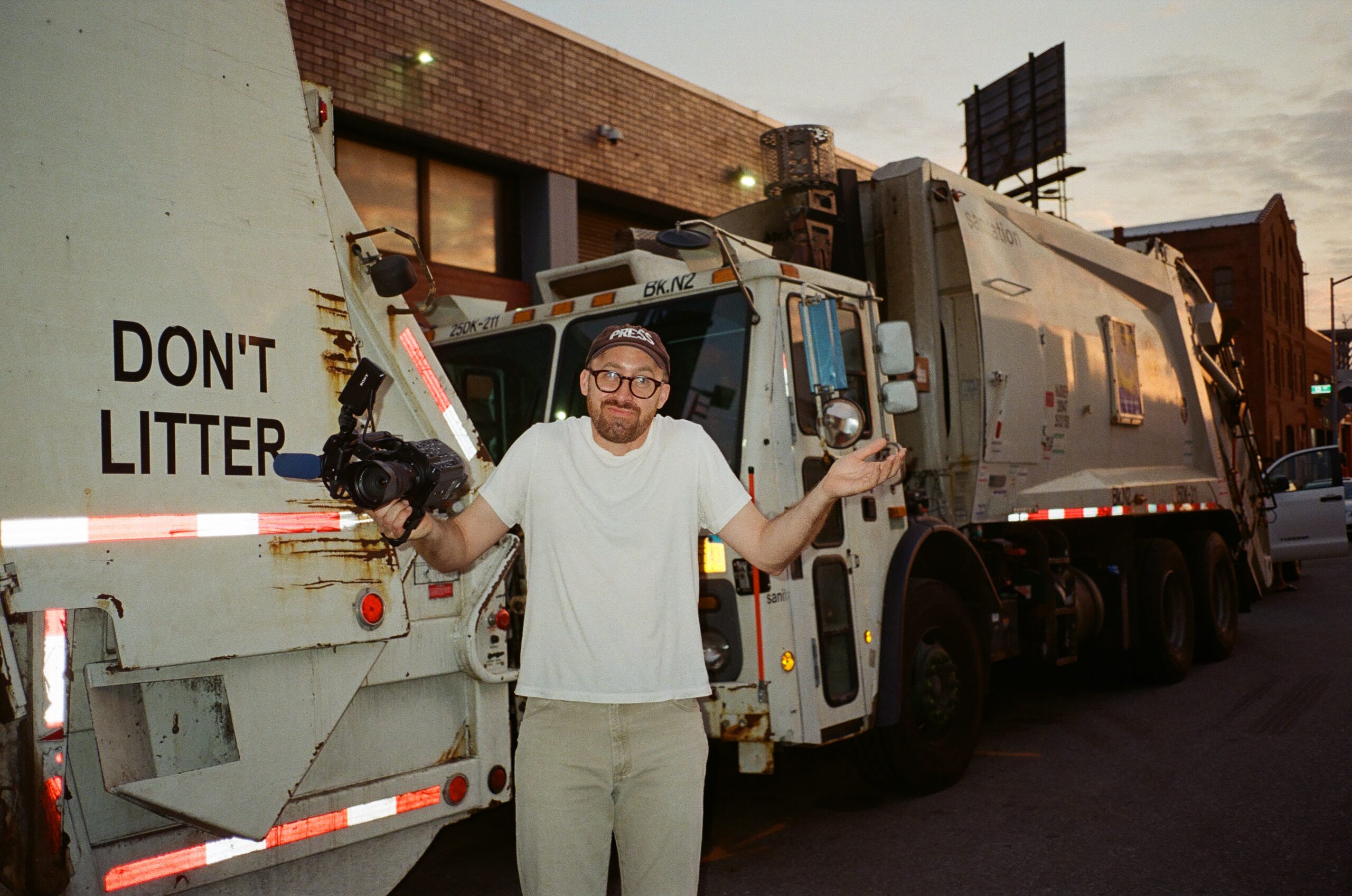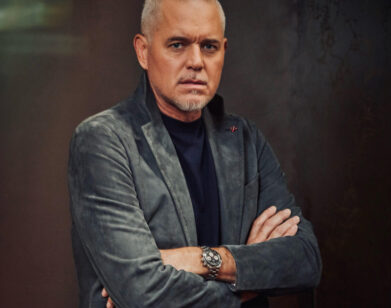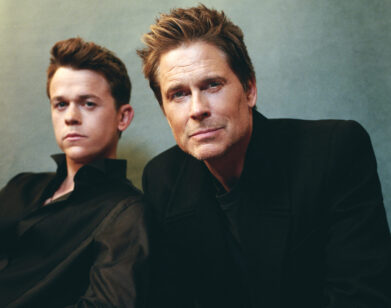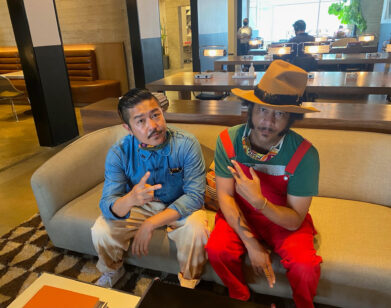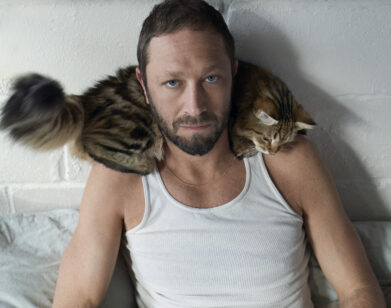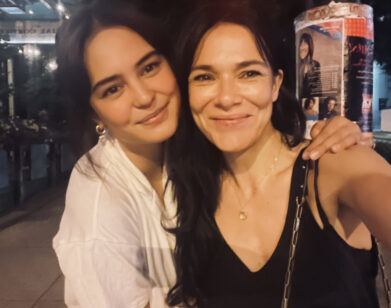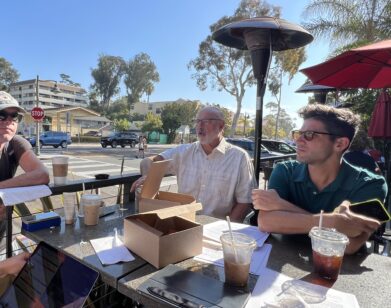FINALE
John Wilson Tells Us About the Knotty Conclusion of How To
For the past three years, John Wilson has been a cultural tour guide, scavenging New York City for uncanny sights and unusual characters. When his HBO docuseries, How To with John Wilson, premiered during the darkest days of COVID-19, Wilson’s ode to the peculiarities of everyday life became a balm. The show remained as poignant even as the world around it reopened for business, which makes How To all the more impressive.
Wilson’s droll, nasally narration—sometimes likened to a Muppet—sounds understated in casual conversation. But his contemplative pauses are intact, as is his observational wit: when I met him on Zoom, Wilson’s backdrop showed the inside of a dilapidated house. I immediately wondered how it might fit into an episode of How To. That’s the beauty of the series. Watch enough of it and you’ll start to fixate on prosaic encounters that are otherwise forgotten. With How To signing off for the last time, Wilson walked me through the show’s knotty conclusion, his struggle to leave it behind, and how erections became an unlikely through line.
———
MATTHEW JACOBS: Hi, John. Where am I finding you right now?
JOHN WILSON: I’m in my apartment. This is a screenshot from Zillow that I took.
JACOBS: You found that on Zillow? It’s a home that’s for sale?
WILSON: Yeah, somewhere upstate. I think it’s still for sale if you’re interested.
JACOBS: It seems really enticing. I see why somebody would want it. How does it feel to be ending this chapter in your life?
WILSON: I’m very glad that people are watching. I don’t know. I feel a little, like, melancholy. I think maybe that’s just this morning, though. It changes every day. I’m usually happiest when I’m actively working on something new, and I’m just trying to figure out which thing that is right now. So I’m kind of in this limbo. But it feels really good to watch the reaction to the show.
JACOBS: Since production wrapped on the third season, how often do you find yourself thinking of ideas or images for the show? Was it hard to let go?
WILSON: Yeah, it’s really tough. I’m constantly seeing imagery or noticing new problems with the city and with myself that need attention. It just comes down to finding the right container for it, whatever that is. It’s something I really can’t turn off, I’m realizing. But it’s the same thing with the second-unit crew that shoots a lot of the show. Like, I’ll tell them to shoot houses that look like faces for six months and then they can’t stop seeing it and sending me pictures of them.
JACOBS: Does it leave you with this sense that certain things won’t be paid attention to unless you have a camera in your hand and an opportunity to draw a narrative out of them?
WILSON: Yeah. Certain things will be captured by other people and then scattered around, but I really liked having the ability to preserve these very transient moments within city history. That’s something that I definitely did need a break from for a moment. I realized that there’s just still so much to cover. I still shoot everything. I haven’t stopped doing that. I’ve just got to figure out how to render it now.
JACOBS: The final person we spend extended time with in How To is a cryopreservation enthusiast who castrated himself as an adolescent in an attempt to terminate his sex drive. What made him the right person to close out the show?
WILSON: I feel like he kind of gives you the tools to deal with the end of the show, in a way. But also, I think so much of the show has to do with the denial of pleasure and having to find weird, strange ways to deal with the fact that you’ll never be fully satisfied in a city because of whatever bureaucracy, or socially. I feel like the cryonicists were a really interesting case study because they were thinking as far into the future as they possibly could but they were still concerned with preserving, like, certain physical objects that they want to bring with them to some unspecified date. I feel a very similar impulse with the show where I want to preserve as much imagery as I possibly can for people, potentially, in 1,000 years, even though who knows how we’ll be ingesting any kind of media at that point—if at all, if we even survive as a species.
JACOBS: Sure.
WILSON: In the first season, we have this man that’s trying to regrow his foreskin to achieve maximum pleasure, and I really like the way it rhymes with this castration man. They have kind of a similar enthusiasm about what they’re doing, but their methods are inverted. I really like symmetry like that. Also, the very first shot of season three is of this erection—the Empire State Building framed perfectly on the stairs—and we end it with a man who—
JACOBS: Has denied himself an erection for his entire life.
WILSON: Yeah, it’s very much the inverse image.
JACOBS: Over the past few years, have any of the subjects featured on the show reached out to you after their episodes have aired, and what have they said?
WILSON: The anti-circumcision guy reached out. He really loved the exposure and seems to be enjoying his appearance. Sometimes they reach out to producers but don’t always have a direct line to me. Certain people I just see in the neighborhood every single day. The guy that taught me how to cook risotto lives right down the street and I see him all the time. I go to his yard sales. The neon guy, I see him at the bar every other night. There are certain people on the show that are just part of my daily life.
JACOBS: I thought about the Avatar fan group when the sequel came out last year.
WILSON: Yeah, I did hear from the Avatar fan group. They were really happy with their appearance, but they were also just really excited that they got a few new members. They really enjoyed the new Avatar, and we had a kind of running dialogue about that.
JACOBS: You mentioned taking in the reactions to the show. These last couple of episodes have left people with a lot to kind of ponder. In the penultimate one, “How to Watch Birds,” you peel back certain layers of the show and kind of challenge the assumption that everything we’ve seen over the last few years is real. With the end of the series, did you set out to change people’s perceptions of the show?
WILSON: It just happened organically, the kind of confessions that happen in season three. Like, I really do start with something as innocent as how to watch the game or how to watch birds. I want the show to be as close to a mental imprint of my thought process when thinking about the subject matter as I can. So with birds, it was the anxiety about honesty, and what is a lie? Is a lie by omission untruthful? And that’s where that episode ended up. I don’t know why people think that everything else was fake. I thought I did a pretty good job—maybe not—of just letting you know that this one toilet shot was faked. But then people keep asking me if other stuff is real.
JACOBS: Does that upset you?
WILSON: Yeah, it was disturbing to me because a lot of it is my actual life. Just ask my friends. This is the world I inhabit. But there are fictions in the editing process of everything. None of it happens chronologically. The way I ended up in certain places sometimes is a bit more deliberate than it seems, but at the end of the day, you are watching a real person with a real story. That is the most important thing to me. None of these people are actors. That’s something I really want to stress. It really upset me that anyone thought that anyone in this was an actor. I make this work because I want to create a framework to showcase some of the most interesting American stories I’ve ever heard.
JACOBS: There’s a very robust Reddit thread unpacking the show, and one commenter said something that reflects the way I felt about How To, which is, “John Wilson makes me love the world and the people in it more with each episode.” I think the idea that maybe some of John Wilson’s show could have been, to some degree, manipulated or staged makes people say, “But wait, this show made me love the world more. So if it’s fake, then how am I supposed to feel about the way that the show made me feel?”
WILSON: Yeah, and I understand that. I think they’re really overreaching when they’re spiraling out of control trying to think about what’s real and what’s not. Like, all this other stuff that made you feel hopeful about humanity is real. None of that has changed. Just because I faked a couple of toilet shots doesn’t mean that the Avatar people are reading a script. It’s outrageous to me. And I understand how people that are maybe not as production literate may not be able to understand that, but, like, in the birds episode, that guy, Bruce Beveridge, delivered one of the most unbelievable monologues I’ve ever heard in any fiction or nonfiction. That was fully happening in the moment, when you hear about police corruption and how only one person can be alive if you want to keep a secret. There are certain things that seem too good to be true that are actually true all across the show. I don’t want people to feel betrayed at all. The birds episode was just me trying to become closer with the audience and let them know that even if some of the smaller moments and transitional moments have a little help narratively, it does not foundationally change what the heart of the show is.
JACOBS: I do think that’s what people are going to walk away with at the end of it. I think it just feels like there’s a twist. But I think that’s kind of exciting and thorny and fun to think about.
WILSON: Yeah, I hope so. There’s kind of a coming-out happening a little bit.
JACOBS: As a journalist, I get a rush when a source gives me a great sound bite or tells me an anecdote that’s particularly revelatory. I know it’s hard to think back to the many subjects and conversations you’ve had over the years, but can you think of somebody who said something that sparked that same rush for you?
WILSON: There’s a couple just from the very first episodes: the man who revealed to me that he hunts child sex predators. I shot that and I was floored. But then I went back to the production office and told [executive producer] Nathan [Fielder] about it, and he was like, “Oh, we absolutely just need to go to his house right now.” And we did, and then that was such a funny shoot. The one big thing we cut out of that scene was when we go to the gas station where he lures alleged sex offenders. The manager of the gas station comes out and he’s like, “No, no, no. I don’t want him around here. All he does is bring sex offenders to my gas station.”
JACOBS: Understandable.
WILSON: It’s such a funny problem to have as a gas-station manager. Or the energy-drink CEO. I really felt like I had just robbed a bank after walking out of his place. It was one of the most euphoric moments of my life.
JACOBS: And he didn’t know you were showing up?
WILSON: He had no idea. He had a fucking, like, Bridgerton-themed baby shower. Like, so insane. I’m trying to think. I mean, when I finished that interview with Bruce Beveridge—up until that point, he still had no idea what was going on with the explosion and everything. I left the car, and then I just went and hugged my producer Michael Koman behind a wall because it was just the most riveting thing. But then I went back in the car and told him we were about to blow up a duplicate of my automobile. And his first reaction was, “Oh, you have permission to do that?” And I said, “Yeah, we have permission from Tennessee and we have police involved,” and he’s like, “Okay, can I call my wife so she can watch, too?”
JACOBS: Conversely, is there someone particularly memorable who either wouldn’t sign the release or just didn’t make it into the edit?
WILSON: When I was killing time in Scottsdale before the [cryonicist] event started, I went to this hospital where they had a box built into the wall where you can drop a baby and close it back up and leave the baby there anonymously.
JACOBS: Like, if you want to get rid of a baby?
WILSON: Yeah, and the hospital, no questions asked, just takes the infant and then puts it into the hospital and I guess gives it up for adoption. That was something that I was sad to lose from this finale, but it felt like kind of a speed bump. In terms of release stuff, the only thing I can really think of is we were filming one couple that was arguing really intensely in season one. Then we went up to them and asked them to get a release, and they were like, “Oh, we would actually have no problem signing a release, but we can’t be seen together.
JACOBS: Oh no! That’s funny.
WILSON: So we ended up not using them.
JACOBS: Explain the recurring Ron Howard references.
WILSON: [Laughs] I didn’t think that people would latch onto that, really. Yeah, what are the two references?
JACOBS: At one point, don’t you put in a DVD of Frost/Nixon? And then there’s a shot of him on a set directing.
WILSON: It’s the Frost/Nixon behind-the-scenes movie, and then I look up his net worth. Yeah, I think it’s just fun. I mention James Cameron a handful of times, I mention The Matrix a handful of times, I mention Ron Howard a couple of times. I don’t think there’s any real reason for it. I just think it made people laugh for some reason. Ron Howard is just a funny legacy director. As a film nerd, he’s kind of a funny person to valorize.
JACOBS: We all love Ron Howard—
WILSON: Yeah, I like Ron Howard!
JACOBS: But there is something about a Ron Howard reference, as far as filmmakers go, that’s innately a little goofy that makes it really work.
WILSON: Okay, I’m glad.
JACOBS: I guess I’ll close out by saying I just admire this show so much. I know you’re hearing different versions of this a lot, but I’ve never seen anything like it. I don’t usually get corny at the end of interviews, but thank you so much for this show, John. It’s so special. For people who are having How To withdrawals, what are some documentaries you would recommend? I know you’ve cited inspirations like Frederick Wiseman.
WILSON: One of my favorite shows from the past year was Paul T. Goldman. That guy Jason Woliner made that. I really liked that. Los Angeles Plays Itself is a nice come-down, potentially. There are a lot of essay films out there that could scratch a similar itch, like The Gleaners and I.
JACOBS: Great pick.
WILSON: Or Tokyo-Ga I really love. Or Social Life of Small Urban Spaces. That’s my number one recommendation, just because it very much deals with the way that the city is designed and makes you feel like you can actively do something to change it, potentially. I don’t want people to feel withdrawal for too long, because, again, I can’t stop. I’m going to be back in just a slightly different form, but I think it’s still going to have a lot of tonal similarities and will hopefully make people feel something similar.
JACOBS: So it sounds like you do have your next thing lined up.
WILSON: Yeah, I have a few very big ideas. I just need to figure out which one makes the most sense right now. But it’s just a strange time in terms of pitching stuff.
JACOBS: With the strikes?
WILSON: Yeah, like, is it gonna be a Writers Guild show? I don’t think I’m going to use any actors, but, you know, the landscape is strange right now.
JACOBS: Definitely. Well, thank you so much for your time today. Thank you so much for this show.
WILSON: Thank you for watching. It really warms my heart that you truly feel that way and would break decorum to say so.

